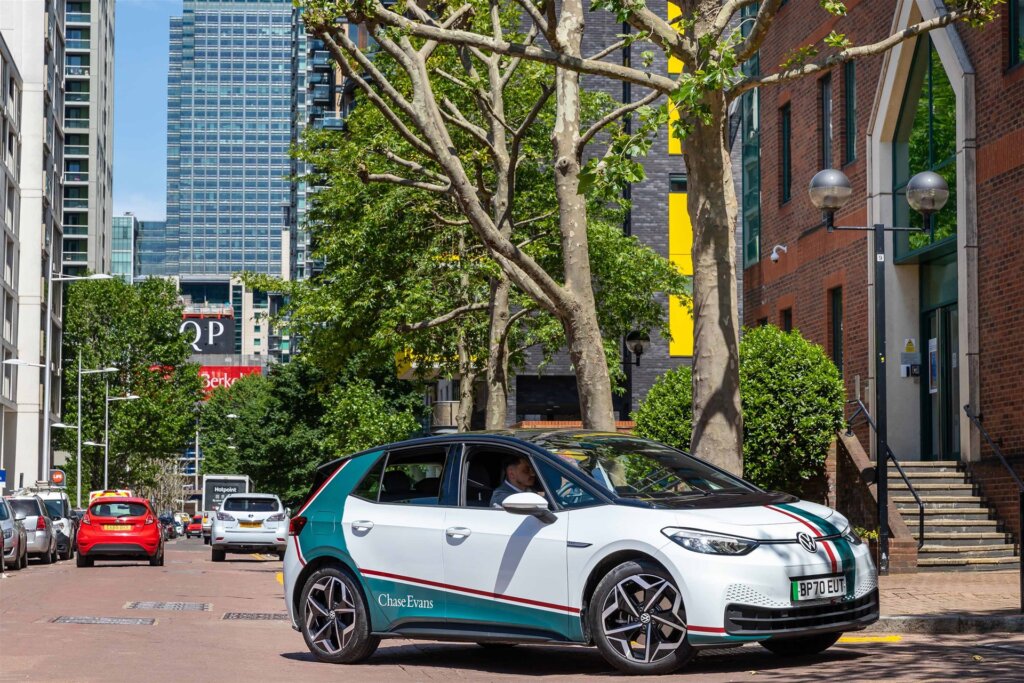Three years into a collaborative partnership with leasing company, Volkswagen Financial Services (VWFS) Fleet, London-based estate agency, Chase Evans now has a 55-strong fully electric fleet.
A smooth transition to electric vehicles (EVs) has delivered significant cost savings for the business, improved fleet operational efficiencies and produced marked carbon emission reductions.
Chase Evans is a full service estate and lettings agency. Its fleet of 55 vehicles are used to collect and transport viewers of properties around London.
The fleet has a combined weekly mileage of around 2,500 miles, with journeys undertaken to all parts of London. Looking to ensure the fleet operation was as cost-effective and sustainable as possible, Aden Somefun, Fleet Manager at Chase Evans, decided to begin the company’s fleet transition to an electric future. He says:
“Traditionally, our fleet was made up of petrol-engine cars. In 2016, we transitioned to a hybrid fleet – but the end goal was always a full-electric solution. Three years ago, we started our transition to electric.
“There were two main reasons for switching to electric. Firstly, I wanted to unlock cost savings – and through initial analysis, it was clear EVs would offer significant cost savings for our fleet. Secondly, the obvious sustainability benefits. As a London-based business, where our drivers’ journeys involve a lot of stop-start traffic conditions, EVs presented us with the opportunity to remove our previously high stationary carbon emissions entirely.”
Driving costs down
Working with VWFS Fleet, Aden was able to identify the fleet cost savings associated with the switch to EVs. This helped him to make the business case for the transition.
Amanda Harris, Corporate Account Manager at VWFS Fleet, explains the process behind this: “To support the decision-making process, we needed to evidence how EVs would result in cost savings for the fleet. We were able to demonstrate the tangible cost benefits of EVs through a whole-life cost (WLC) analysis, which helped Aden to make the business case and secure leadership buy-in for the transition.
“With service, maintenance and repair (SMR), fuel and operating costs all factored in, it was soon evident that it would be cheaper for Chase Evans to run a fleet of EVs, in comparison to ICE or hybrid solutions.
“We recommended the supply of Volkswagen ID.3s on a three-year lease cycle. This was the perfect answer for Chase Evan’s EV ambitions, as the cars are compact and efficient, and offer lower ULEZ costs, which makes them ideal for use around London.”
From Aden’s perspective, three particular cost savings around maintenance, parking charges and operational costs, stood out.
“Firstly, the maintenance savings were significant. Since switching to EVs, we have seen breakdowns reduce by around 70%, which has had a real impact – not only on costs but also on the operational efficiency of the fleet,” explains Aden.
“Secondly, as we operate in London, parking costs are a significant part of our fleet budget. However, parking permits for EVs are much cheaper in comparison to petrol or diesel cars. Having previously paid £700-800 per year per vehicle for parking, we have seen this cost drastically reduce to just £100 per year for each electric car in the fleet. This alone has delivered a strong cost benefit for us.
“Finally, from a business perspective, our congestion charge costs for driving into and around London have fallen as well. We were previously paying £12.50 per vehicle per day, but are now paying just £10 per year to register each of the vehicles in our fully electric fleet. Put together, these savings are significant. A welcome bonus is our staff with access to home chargers have reported savings of more than 75% from charging at home compared with buying petrol.”
A sustainable fleet future
“There are clear sustainability benefits of switching to EVs,” explains Aden. “This was an important factor prompting the transition for us.
“The high weekly mileage accrued by the fleet, alongside the nature of our drivers’ daily journeys, meant as an organisation we were contributing unwanted carbon emissions, particularly across the city of London and the wider area. The switch to electric now enables us to play a positive role in tackling the climate crisis, ensuring we’re operating our fleet with an eye on our sustainability responsibilities.
“Since transitioning to EVs, we have delivered carbon emission savings far beyond our initial expectations. We couldn’t be happier with the results.”
 Volkswagen ID.3 in Chase Evans’ fleet
Volkswagen ID.3 in Chase Evans’ fleet
A successful, forward-thinking partnership
Since supporting the fleet’s transition to electric, VWFS Fleet continues to support Chase Evans to maximise fleet efficiency and identify further operational cost savings.
“VWFS Fleet makes things simple for us. For example, having the maintenance package bundled within our monthly lease payments is great. As well as simplifying administration for is, it also means any maintenance issues are dealt with straight away, without any hassle or unnecessary delays.“
“Where we have needed to replace tyres, this has been managed and authorised almost immediately – which is not something we have experienced with previous fleet suppliers. Additionally, the customer service team is always excellent to deal with, quick to respond and proactive when we need support.“
Looking to the future, Chase Evans has started to formally extend its current EV rental contracts. By taking advantage of VWFS Fleet’s flexible extension options, which include no additional administration fees, this will ultimately further reduce fleet operating costs.
“Moving to an electric fleet was a significant, strategic business decision for Chase Evans,” concludes Aden. “With VWFS Fleet’s support, I was able to quickly make the business case, agree the right solution and implement what has been a seamless transition. This has not only made our fleet more cost effective and operationally efficient, but it also ensures we’re living up to our sustainability values.”